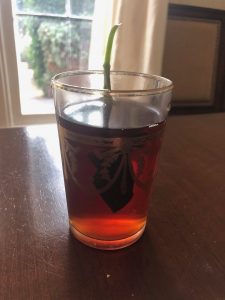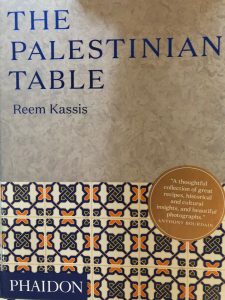
I first learned to make sage tea from a Jew who called himself Palestinian.
Mr. Yadeni was born in pre-state Palestine in the early 1900s. By the time I met him, he was old. He had made some money creating Israel’s first lock company in 1947, the still-going Yardeni Locks, and he lived on plot of land in Ein Kerem, in the hills of Jerusalem. He was in love with the land. As a boy he had hiked every inch of it, and in his retirement he spent hours tending to his garden and foraging. I think for him the land came before politics. It was there before the first Arab or Jew ever set foot on it, or bled on to it, and it will, God willing, be there long after we are all long gone. Yardeni showed me how to make wine from the pomegranates, zaatar spice from the wild oregano, and tea from the mint and sage. Mint, he explained, was for summer and spring, sage for fall and winter. To this day, in LA, that’s what I do.
Not surprisingly, as I started cooking fro Palestinian cookbooks, I came across sage tea. A recipe for int tea appears in Joudie Kalla’s Palestine on a Plate, and in The Palestinian Table, Reem Kassis features a recipe for sage tea .  The key to making it is to use black tea (caffeinated or decaf) and plenty of sugar. You steep it all together a few minutes, and enjoy. Yardeni used wild sage that he picked himself. I use the stuff from my garden or, you know, the supermarket.
The key to making it is to use black tea (caffeinated or decaf) and plenty of sugar. You steep it all together a few minutes, and enjoy. Yardeni used wild sage that he picked himself. I use the stuff from my garden or, you know, the supermarket.
Even the supermarket stuff evokes for me the flavor of the Jerusalem or Galilee hills. I can’t pour myself a cup without thinking of Yardeni, sipping from his glass between puffs of his pipe (he smoked an old Shalom briar, another pre-state product). I had many glasses of sage tea with Yardeni, and even more when I’d sit the cafes of East Jerusalem in winter. On the street leading into the Old City from Damascus Gate, Palestinian women in heavy embroidered black dresses still sit beside piles of sage, selling it for just that purpose.
The Israelis and Palestinians I love most are like Yardeni, the ones who love and appreciate the land they live on. The more distance I get from covering the day to day craziness of Israeli politics and the Israeli-Palestinian conflict, and the more I focus just on the land and the foods, the simpler the solution seems to me: Just share it.
Its easy to get caught up in the weeds of the conflict. Try focusing on the herbs.
See my video on Instagram @foodaism.